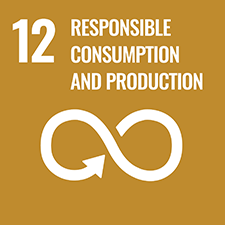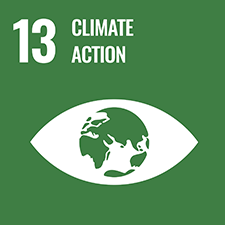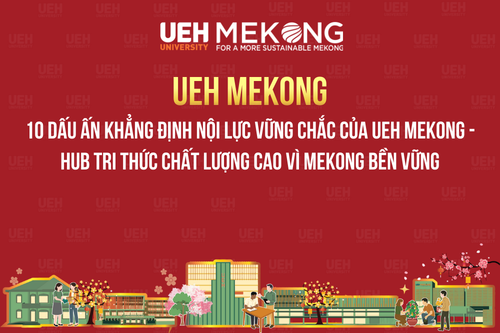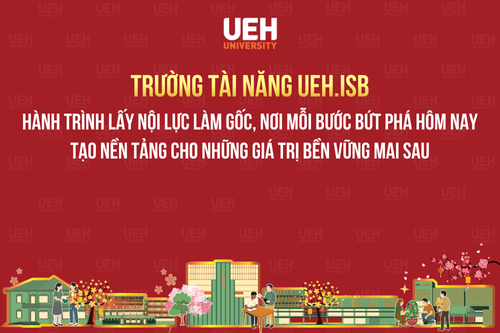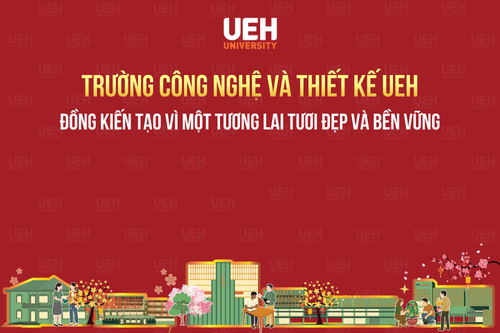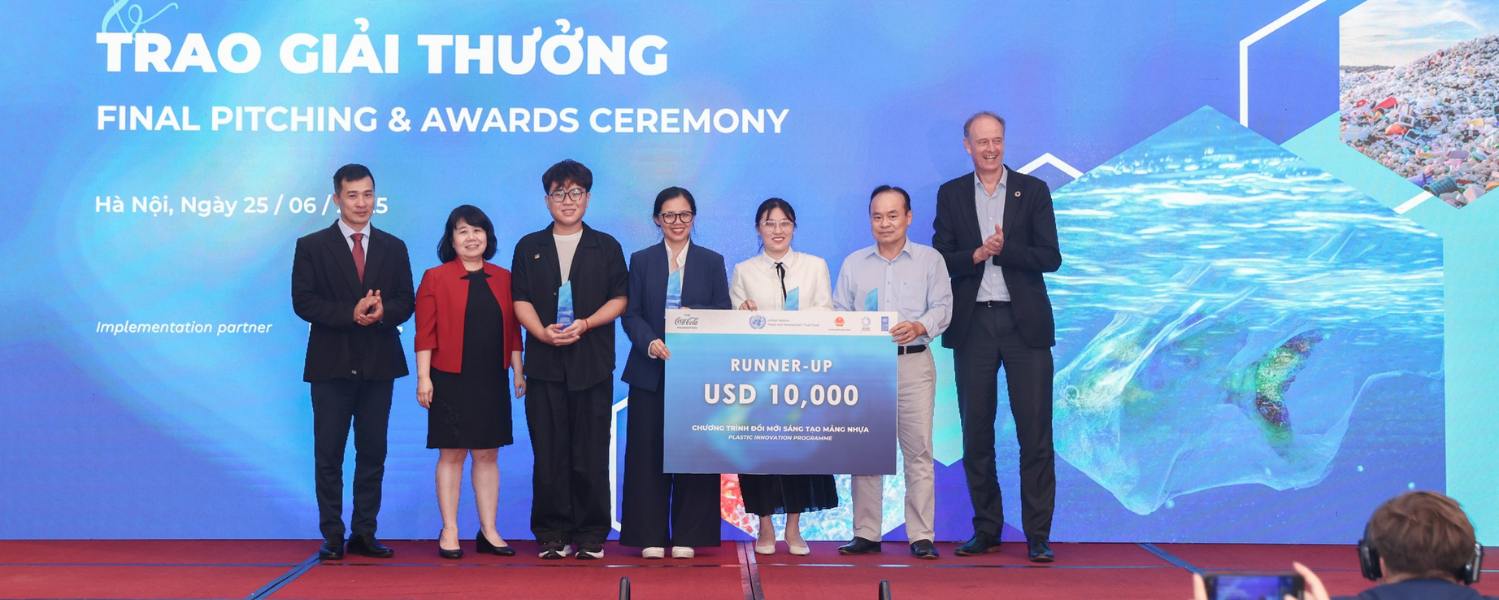
UEH Successfully Secures $10,000 Grant from the 2025 Plastic Innovation Program
03 Jul, 2025
On June 25, 2025, in Hanoi, the University of Economics Ho Chi Minh City (UEH) achieved a remarkable milestone by securing a $10,000 grant from the Plastic Innovation Program (PIP) with its pioneering solution, the No Single-use Plastic Campus System. This success came after surpassing 116 nationwide proposals and undergoing a rigorous two-month incubation phase guided by a panel of experts in the plastics sector.
UEH’s recognition among the Top 10 innovative proposals, earning the $10,000 grant to further its impactful work.
Launched in February 2025, the Plastic Innovation Program is a collaborative effort by the Ministry of Agriculture and Environment and the United Nations Development Programme (UNDP), with support from the UN Peace and Development Fund and the Coca-Cola Foundation. Its mission is to end plastic pollution and prevent plastic waste from reaching rivers and oceans by fostering innovative, scalable solutions to combat plastic pollution across Vietnam. Coordinated through the National Plastic Action Partnership (NPAP) platform, the program aligns with Vietnam’s national strategies, including Decree 57 on science, technology, innovation, and digital transformation, while reinforcing the country’s push toward a circular economy.
The final round of the competition saw distinguished attendees, including:
+ Mr. Le Cong Thanh, Deputy Minister of Agriculture and Environment.
+ Ms. Ramla Khalidi, UNDP Resident Representative in Vietnam.
+ Ms. Nguyen Phi Van, Chairwoman of the Vietnam Franchising and Licensing Network.
A total of 25 teams from businesses and higher education institutions presented their proposals to an expert jury, comprising:
+ Mr. Vu Duc Dam Quang, Deputy Director of the International Cooperation Department, Ministry of Agriculture and Environment.
+ Mr. Tran Xuan Dich, Deputy Director of the Department of Entrepreneurship and Technology Enterprises, Ministry of Science and Technology.
+ Ms. Bui Dang Duyen Mai, Director of External Affairs, Communications, and Sustainability at Coca-Cola Vietnam and Cambodia.
+ Mr. Erlend Skutlaberd, First Secretary at the Norwegian Embassy in Hanoi.
+ Ms. Sheila Carina, Regional Investment Manager at P4G Asia.
+ Ms. Pang Thitirat Sittakaradej, Senior Manager of the Innovation Support Project for Enterprises (ADB Ventures), Asian Development Bank.
+ Mr. Pham Tuan Hiep, Director of BK Fund and Incubation Director at BK Holding.
Notably, of the 116 proposals submitted, nearly half originated from small and medium-sized enterprises, over 40% from academic, research, and educational organizations, 42% were led by youth, and an impressive 91% included women in their teams.
Navigating a highly competitive selection process among 116 proposals, UEH’s comprehensive No Single-use Plastic Campus System earned a spot in the Top 25 innovative proposals, advancing to an intensive incubation phase to refine the solution. Following the finals, UEH secured its place among the Top 10 outstanding teams, receiving the $10,000 grant to enter a nine-month acceleration phase for piloting, implementing, and scaling its initiative.
At the conference, Deputy Minister Le Cong Thanh emphasized the broader significance of the event, stating: “This is not just a competition. It is a launchpad for innovation, a catalyst for green business models, and a practical action to implement national policies on circular economy and reducing ocean plastic pollution.”
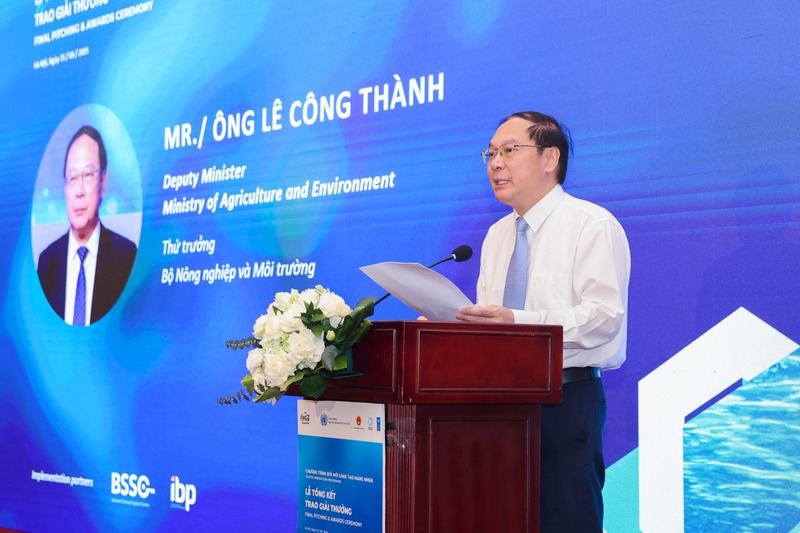
Mr. Le Cong Thanh, Deputy Minister of Agriculture and Environment delivering opening speech
Ms. Ramla Khalidi, UNDP Resident Representative, also praised the vibrancy of Vietnam’s innovation ecosystem, remarking: “The competition reflects the strength of Vietnam’s innovation ecosystem. A dynamic community is rising to confront one of the most urgent challenges of our time: plastic pollution. The teams in today’s finals are not just presenting projects; they bring solutions and hope for a more sustainable and resilient Vietnam.”
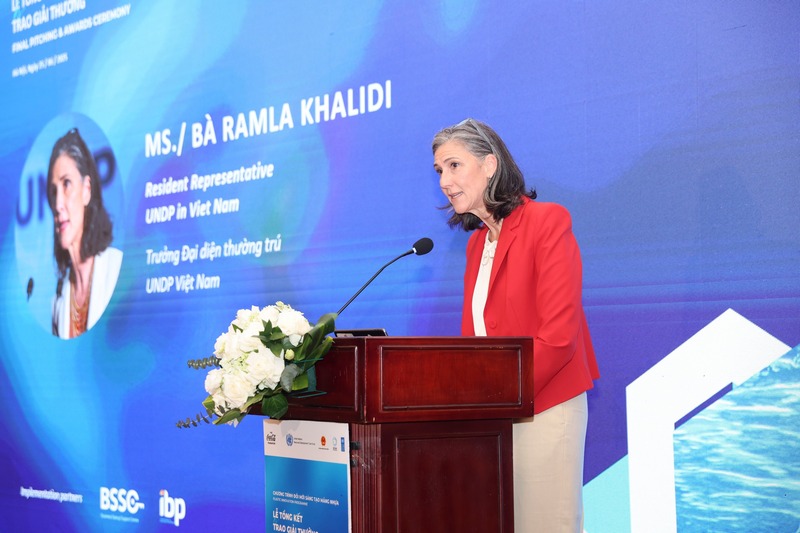
Ms. Ramla Khalidi – Resident Representative, UNDP Vietnam, delivered a speech.
About the No Single-use Plastic Campus System, an innovation of UEH Green Campus Living Lab Project - UEH Sustainable University Project Board
As a cornerstone of UEH’s Sustainable University Strategy under the Living Lab UEH Green Campus Project, the No Single-use Plastic Campus
System offers an innovative approach to eliminating single-use plastics on university campuses. With a user-centered design, the system intervenes at every stage of student behavior:
+ Demand Generation Phase: Students’ awareness is raised through sustainability courses and gamification activities to curb unsustainable consumption habits.
+ Purchase and Use Phase: A set of “Green University” regulations, alongside nine plastic reduction actions, encourages responsible consumption.
+ Disposal Phase: UEH has deployed Go Green Stations based on Model 3 and Model 7, aiding students in accurate waste sorting at the source with support from technologies like Zeen AI Bot and I Ve Chai Machine. Sorted waste is then transferred to reputable collection and recycling entities such as Ve Chai Chu Hoa, Moi Truong A Chau, and Botol.
The system operates through the integration of cutting-edge technology, robust partnerships, and impactful communication, forming a green, sustainable, and smart cycle. This comprehensive solution ensures that every small action by students contributes to a friendly learning environment while promoting a responsible lifestyle and spreading sustainable development values to the wider community.
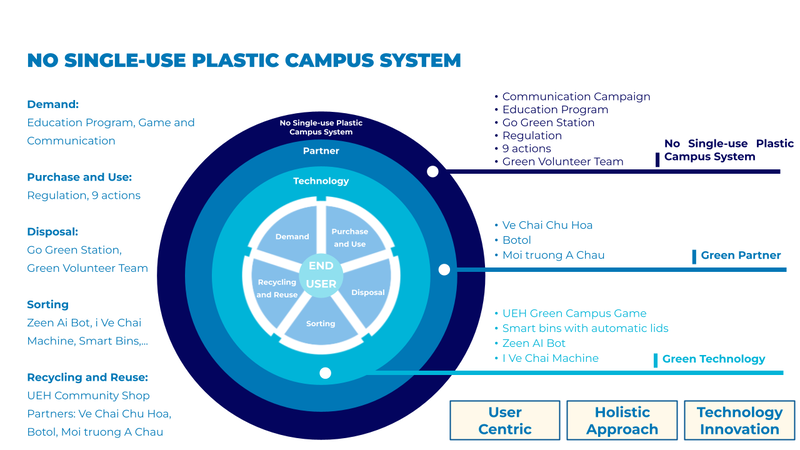
No Single-use Plastic Campus System at UEH
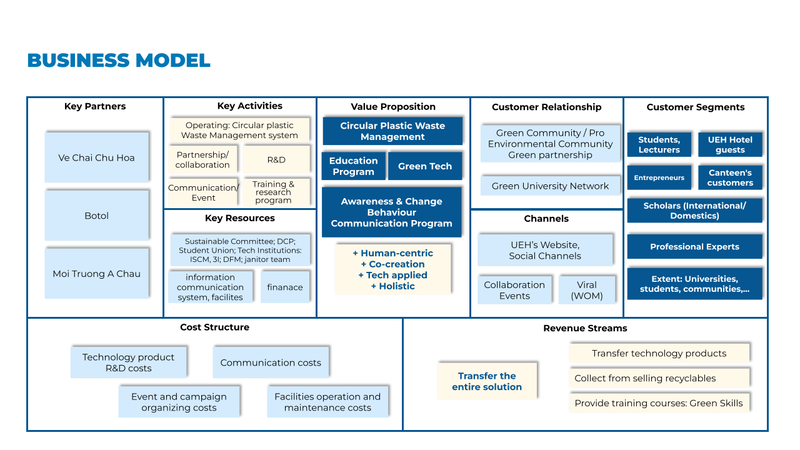
The business model that helps the project operates and develop sustainably
With the $10,000 grant from the Plastic Innovation Program, UEH will further enhance the No Single-use Plastic Campus System, a flagship solution in its journey toward becoming a UEH Green Campus. The initiative aims to build a circular ecosystem for single-use plastic waste within the university setting, reducing plastic pollution and fostering a green lifestyle among the UEH community. Specifically, the funding will support:
+ Refining the plastic waste circular model.
+ Strengthening partnerships.
+ Developing technological products.
+ Scaling the initiative across all 13 UEH campuses.
This project marks a significant step in the UEH Green Campus journey and underscores UEH’s unwavering commitment to driving innovation for sustainable development.
|
About UEH's Sustainable Development Strategy: UEH's sustainable development strategy is comprehensively implemented across five pillars: Training, Research, Operations, Governance, and Connect the Community. Specifically: Training: UEH maintains lifelong learning and Glo-cal training foundations through courses, short-term and long-term courses for different subjects to contribute to SDG 4 — Quality Education. Equipping learners with the ability to make wise, balanced, and comprehensive decisions. At the same time, the University also focuses on providing solid foundational knowledge about sustainable development as a mandatory subject for all majors, helping learners not only understand but also create positive changes for the environment and society, towards sustainable development. In recent years, the university has opened 13 new multidisciplinary training programs meeting modern trends and human resource needs for future generations such as: Technology and Innovation, Digital Communication and Multimedia Design, Accounting Integrated with International Professional Certificates, Financial Technology (Fintech), Marketing Technology (Martech), Digital Business, Robot and Artificial Intelligence Engineering (Robot & AI), Logistics Technology and Supply Chain Engineering (Logtech), Information Security, Information Technology, Computer Science, ArtTech, Intelligent Control and Automation. Nearly 100 extracurricular educational activities, competitions, discussions, and events with themes related to sustainable development, environmental protection, green technology, green economy, green university, circular economy, sustainable cities, etc., have taken place. Research: UEH has had over 500 research papers by faculty and staff and hundreds of student research papers related to green lifestyle themes, circular economy, etc., contributing to SDG 7 — Affordable and Clean Energy, SDG 12 — Responsible Consumption and Production, SDG 13 — Climate Action, SDG 14 — Life below Water. Governance: Implementing the consistent principle of "Democracy — Transparency — Fairness," all members at UEH are equal, guaranteed rights, regularly participating in decision-making, implementing policies, activities, and programs. Additionally, UEH integrates sustainable activities into school governance operations and builds green culture as a daily activity contributing to SDG 12 — Responsible Consumption and Production, SDG 15 — Life on Land, SDG 16 — Peace, Justice and Strong Institutions. Operations: In the process of operating the green campus with the UEH Green Campus project, to date, 8 tons of landfill waste have been reduced through the application of thorough source waste sorting models, contributing to increasing waste life cycles and responsible consumption according to SDGs 12 and 15. Connect the Community: UEH continuously connects with organizations and communities interested in the sustainability field to share and discuss solutions to environmental challenges, including the International Forum on Sustainability (IFS) contributing significantly to SDG 17 — Partnerships for the Goals. |
Pillars: Operations, Connect the Community
Project: UEH Green Campus, UEH Connecting
News and images: UEH Sustainable University Project Board, Department of Communications and Partnerships
Media Coverage of the Competition
UNDP: Vietnam honors breakthrough initiatives against plastic pollution.
People’s Army Newspaper: Ministry of Agriculture and Environment honors 12 anti-plastic pollution initiatives in 2025.
People’s Newspaper: Inspiring creativity for a Vietnam free of plastic pollution.
VietNamNet: A launchpad for green solutions toward a Vietnam without plastic pollution.
Vietnam Economic Magazine: Promoting innovation to end plastic pollution.
Lang Son Newspaper: Plastic innovation: Urgent action to end “white pollution.”
Investment Newspaper: Vietnam promotes innovation to eliminate plastic pollution.

